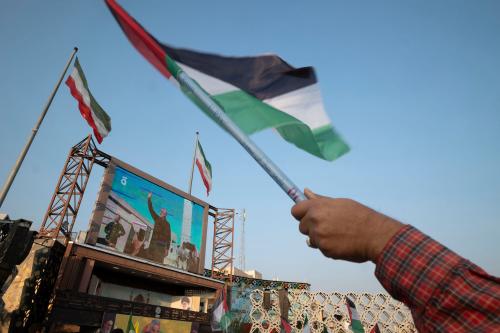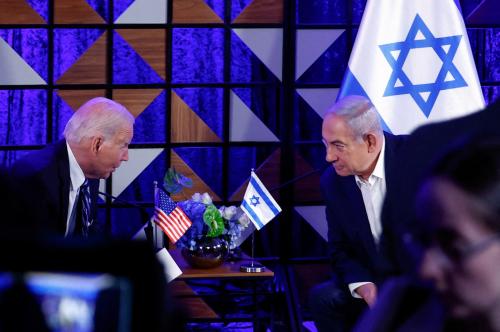A clear US commitment to a complete, irreversible withdrawal from Iraq may now be the only way to develop a regional concert of powers that could work with Iraqis to try to stabilise the country and cauterise the conflict.
The continuing US and British occupation is a roadblock to that co-operation. The galvanising impact of a decision to depart unequivocally can be the last best chance at preventing the conflict from boiling over beyond Iraq to the whole region. How we design and implement our departure is our last significant remaining leverage.
There is no guarantee that this will work, but geopolitical self-interest may encourage wary co-operation from Iraq’s neighbours. Iran does not need to invade Iraq to have influence there. The Saudis and Jordanians do not have the military capability to invade. The Syrians are not interested and, in spite of some sabre-rattling, the Turks do not need more Kurds to try to pacify. Focusing on ending the occupation and bringing order in its wake may be the best chance left to end our involvement while keeping the civil war contained to Iraq.
None of Iraq’s neighbours was eager for the invasion four years ago, with the possible exception of Kuwait. All of them saw the US and UK occupation as inherently destabilising, especially if it looked permanent. All are now worried that the civil war in Iraq will serve as a breeding ground for terror and violence that will be increasingly exported to their own countries. Iraq is already a safe haven for al-Qaeda terrorists who have attacked Jordan, Saudi Arabia and Lebanon, and for PKK terrorists who attack Turkey. Now al-Qaeda is threatening to attack Iran for meddling on the side of the Shia in Iraq against the Sunni Arab minority.
But these countries cannot work constructively with an American occupation army – especially not Iran, which has the most capability to be a decisive force given its intimate ties to virtually every Shia and Kurdish politician, its geography and its economic connections. Most of all Tehran wants to see the US leave Iraq for good so it cannot be a base against Iran. The Saudis and Jordanians find it both difficult and less urgent to engage when the occupation is open-ended. The Syrians find Iraq to be a good place to keep America bogged down and less threatening. The Turks fear that a long-term American presence encourages Kurdish -separatism.
These calculations may well change once there is a clear time-line for complete American and British withdrawal and the end of occupation. At that point it is in the self interest of each of the neighbours to concentrate on shaping post-occupation Iraq and especially preventing the terrorist threat that instability creates. All Iraq’s neighbours will find it easier to engage when it is not in support of an occupation army. None will want to see another gain direct control of part or all of Iraq. All will want to avoid a power vacuum for al-Qaeda and other terrorists. We should seek to build on the narrow moment of time when those self-interests might be put into harmony to stabilise Iraq.
For Iraqis as well it is imperative that the US make clear now what it should have been saying from day one: we plan no permanent military presence in Iraq, no bases and no special relationship. We want a fully independent Iraq, not a client state. We should abandon any thought of staying in Iraq for decades as if it were South Korea or Germany. When we suggest such it only rallies more recruits for al-Qaeda, especially foreign suicide bombers. The best way to isolate al-Qaeda is to pull the occupation out from under it.
The United Nations should be invited to convene and administer a contact group of the neighbours that would address several key issues in conjunction with the Iraqi government. At the top of the list would be agreement to assist rather than exploit the peaceful and orderly withdrawal of all foreign military forces from Iraq, agreement to respect the territorial integrity of Iraq, agreement to assist the government of Iraq in controlling and stabilising its territory and funding of a major assistance package.
These are key issues for the transition from occupation to post-occupation. For the US it is obviously important to get help in making the withdrawal of our forces as smooth as possible. We should try to leave behind a regional order that has a chance for stability.



Commentary
Op-edAmerica Must Pull Out of Iraq to Contain Civil War
July 23, 2007